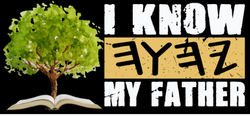Choosing the Best Bible Translation and Resources for a Deeper Faith Journey
Watch the Full Video Lesson Here:
Introduction:
Navigating the vast world of Bible translations and study resources can be overwhelming, especially for those wanting to deepen their faith and understanding. Whether you’re new to Bible study or looking to explore different perspectives, finding the right resources can make your journey more enriching and insightful. Here, we’ll walk through helpful guidance on choosing Bible translations and resources, focusing on simplicity, personal connection, and practical tools.
Here are our favorite bible study tools. Click the link here.
Keep it Simple: Faith Without Complication
When it comes to growing in faith, simplicity is key. The core message is to avoid overcomplicating your spiritual journey. Faith isn’t about using the "right" terms or pronunciations; it’s about your heart's connection to Yahuwah. This means you don’t need to worry about using a specific translation or calling Yahuwah by certain names to feel closer to Him. The focus is on your personal connection to Yahuwah, rather than on strict adherence to certain terms or traditions.
The Power of Community and Prayer Support
Building a community of believers is incredibly powerful for personal and spiritual growth. Finding support within a trusted group, whether through a church, online forums, or prayer partners, allows for mutual encouragement and shared learning. In some communities, people can submit prayer requests anonymously, which allows them to feel supported while maintaining privacy. Effective communication, grounded in respect and trust, nurtures stronger bonds and provides a safe space for spiritual exploration.
Bible Translations and Resources for Deeper Understanding
If you’re wondering which Bible translation is best, consider one that speaks to you personally and is easy to understand. Each translation offers a unique perspective, so don’t be afraid to explore a few. Here are some popular translations and resources:
- Amplified Bible: Known for its expanded wording, this translation is paired with insights from Strong’s Concordance, which helps you understand the deeper meaning of certain words.
- Interlinear Bible: This Bible presents the original Hebrew and Greek texts alongside English translations, helping you grasp the nuances in the original languages.
- Recommended Tools: Bible Hub and Blue Letter Bible are great online resources. They offer free access to a range of study tools, including different translations, cross-references, and word definitions from Strong’s Concordance.
Learning from Early Church Practices
Understanding the history and practices of the early Christian church provides perspective on how faith communities originally gathered and grew. Books like Frank Viola’s The Untold Story of the New Testament Church describe how early believers met in homes rather than formal church buildings, which helped to foster a stronger sense of community. Another valuable read, Pagan Christianity, explores the influences of society on church traditions. By learning about the roots of our faith, we can gain a clearer sense of what aspects are vital to our personal spiritual journeys.
Exploring Extra-Biblical Books for Insights
For a broader understanding of biblical context, some believers also turn to books outside the traditional Bible, like The Book of Enoch and The Apocrypha. These books provide additional insights into the time and culture in which biblical events took place. For example, The Book of Enoch reveals themes that complement the Bible’s teachings, while The Apocrypha includes stories like the Maccabees and Wisdom of Solomon, which discuss essential themes such as the afterlife and wisdom.
Knowledge as a Tool, Not a Measure of Faith
While knowledge is valuable for spiritual growth, it doesn’t equate to salvation. It’s easy to feel prideful when we’ve learned a lot, but humility is vital. Remember, the purpose of learning is to deepen your connection with Yahuwah and to help others on their journeys. Using resources to make the Bible understandable is an act of love and service, helping others see the beauty and relevance of Yahuwah’s word in their lives.
Reaching Others with a Heart for Relatability
Winning souls and spreading faith isn’t about showing off knowledge; it’s about being relatable and approachable. Many people are exploring faith for the first time and benefit most from teachings that are easy to understand and grounded in everyday experiences. By focusing on connection over correction, we can help others grow at their own pace, fostering an environment of love, support, and shared understanding.
Conclusion: Sharing and Growing Together
Studying the Bible can be a shared journey. Don’t hesitate to recommend resources, share your favorite Bible translations, or let others know which tools have been most helpful to you. And, if you can, consider supporting ministries that provide these resources. Together, we can create a strong, supportive community that encourages genuine spiritual growth and understanding.
Embrace the simplicity of faith, focus on your connection with Yahuwah, and lean into resources that bring you closer to understanding His word.

